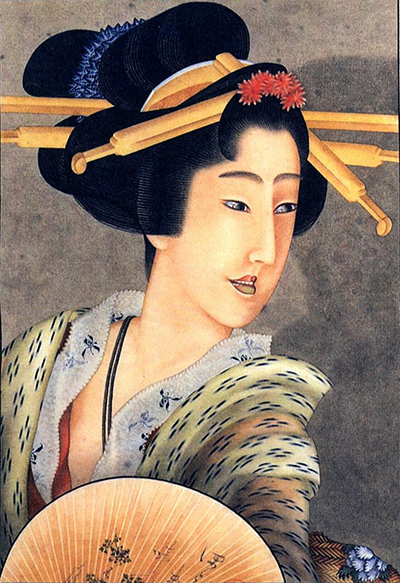Hokusai
Portrait of a Woman Holding a Fan by Hokusai
Portrait of a Woman Holding a Fan is a work of art created by the Japanese painter Hokusai. Perhaps best known for his works The Great Wave and The Dream of the Fisherman’s Wife, Hokusai lived in the region of what is now Tokyo between 1760 and 1849.
He is part of what is known as the Edo Period in Japanese art and culture (a period that ran from 1615 to 1868). Edo is the old name of what we now called Tokyo, but in Japanese this period tends to be referred to as the Tokugawa Period to reflect the fact that this was the period when Edo was ruled by the Tokugawa shogunate. Portrait of a Woman Holding a Fan was painted in 1832 or 1833, so around the same times as Hokusai created what is perhaps his most iconic image, The Great Wave.
The Edo Period in Japanese art was characterised by the development of a particular style of ink and woodblock painting known as Ukiyo-e. This genre of painting focused on the pleasurable lives of geishas, courtesans, urbanites and gourmands. Opulent fabrics, beautiful women and a sense of buzzing activity were all hallmarks of the paintings of this era. Hokusai is generally considered to be one of the most important artists to have worked within the Ukiyo-e genre.
Portrait of a Woman Holding a Fan clearly belongs to the Ukiyo-e genre of Japanese painting. The woman’s traditional and fashionable garments, the beauty of her face and the sense that there is a story behind this picture all mark her out as a classic subject of Ukiyo-e portraiture. One of the other key features of Ukiyo-e painting was the fact that it took a lot of hard work to create (indeed, this is one of the reasons for its ultimate decline towards the end of the Edo period as more effortless Western methods of production came into vogue in the art world). It is perhaps surprising to think that a painting of such freshness and vivacity, and seeming spontaneity, will in fact have taken Hokusai many hours of hard work to create.
